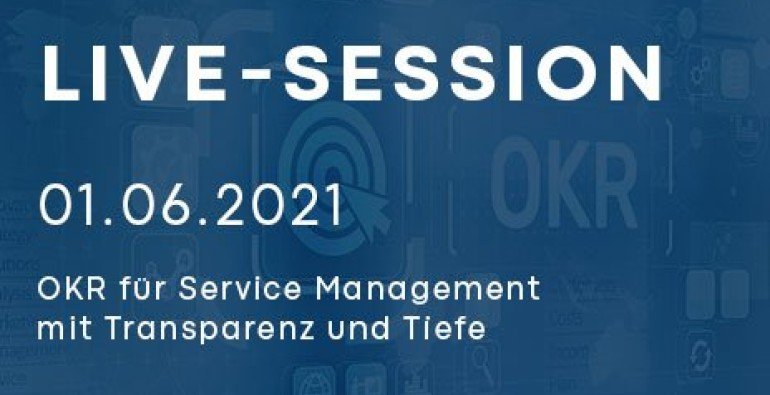Live-session on how to use OKR ("Objectives and Key Results") in software-based service management (together with SERVIEW)

Free live-session on June 1, organized by OMNINET in cooperation with SERVIEW
Please note: presentation is held in German language
- Topic: OKR for service management with transparency and depth
- Time: Tuesday, June 1, 2021, 11:00 am to 12:00 pm/noon CEST
- Location: Remote
In this online presentation, OMNINET together with the process expert SERVIEW will show you how to efficiently implement the OKR concept into your service management landscape. Using a practical example, you will learn the OKR concept in the field of ITSM and how you can monitor the insights gained (key results) with the help of Business Intelligence.
What is OKR ("Objectives and Key Results")?
OKR stands for "Objectives and Key Results" and is a simple, adaptable framework for defining objectives and tracking results. In conjunction with agile service management and ITIL®4, OKR becomes interesting for the management level of all organizations that want to use their ITSM tool more efficiently. The goal of OKR in service management is the (measurable) improvement of services in order to increase customer satisfaction, for example.
Clear goal setting, fair performance evaluation
In the OKR method, it is important to clearly define the objectives so that subsequent monitoring and optimization based on this can take place. Therefore, it must be determined in advance what is to be achieved by which target date. Objectives can be related to projects, departments, locations, etc. In terms of content, there are overlaps with the so-called S.M.A.R.T. goals in project management, where goals are specific (i.e. unambiguous), measurable, appealing (meaning desirable or meaningful), realistic/realizable, and time-bound (fixed end date). These characteristics are important in goal definition so that (similar to the OKR concept) performance evaluation can occur fairly and objectively. This allows an organization's leadership to communicate their expectations clearly and transparently.
Benefits and purpose of the OKR method in IT service management
An organization can benefit in implementing short-, medium- and long-term strategies by considering the principles of the OKR method. In the ITSM environment, this results in the following potentials:
- Focused work towards concretely defined goals
- Better, long-term resource and capacity planning for the service desk
- Measurable achievement of goals, which enables long-term evaluation and optimization of ITSM processes
- On the one hand, real-time monitoring using Business Intelligence enables early countermeasures to be taken if target achievement is at risk. On the other hand, processes can be compared more easily and positive and negative trends can be identified.
- Documentation character, since service processes are "successfully" carried out in writing or still have potential for improvement
- Can be used as an instrument of personnel management, but should not be used to evaluate the performance of individual employees.
- OKR can help you develop realistic and profitable service level agreements (SLAs). This allows service contracts to be formulated in such a way that they are more likely to be met, which improves customer satisfaction.
Contact us if you want to efficiently implement the principles of the OKR concept in your IT service management or to use Business Intelligence for monitoring your ITSM process performances.